Access here Comprehensive Data on Electoral Bonds (as of February 2024)
[orc]Political parties are supposed to submit annual audit reports to the ECI by 31st October every year. They are also supposed to file expenditure reports within 90 days of a Lok Sabha general election. Both the BJP & Congress are yet to submit audit reports for 2018-19 and have not yet submitted expenditure report for the Lok Sabha elections.
Financial transparency of political parties is important for the effective working of democracy. Since most of the political parties depend on funding from multiple sources, it becomes imperative that funding does not become a vehicle for exchanging favours. Hence it is all the more significant that there is transparency in political funding. Various democratic countries have enacted laws which lay down the procedures for political funding, spending and other aspects to bring in transparency in political funding.
What about India?
In India, the Election Commission of India (ECI) is entrusted with the responsibility of monitoring expenditure & disclosures related to political parties, as per the laws made related to election process and political parties. As per Section 29C of the Representation of The People Act, 1951, every party which is registered under Section 29 A is required to submit the following to the ECI every year.
- Annual Audit Report (on or before 31st October of every year)
- Contribution Report (on or before 30th September of every year)
Along with these two reports which are submitted annually, political parties are required to submit their expenditure report post the elections, and within 75 days after State general elections and 90 days after Lok Sabha general elections.
As on date, only 3 recognized National Parties submitted ‘Annual Audit Reports’ for 2018-19
Currently, there are 7 political parties recognized as National Parties in India. All the recognized political parties are required to submit their Audited Annual Reports.
Of these seven, only 3 have submitted their audit reports so far for the year 2018-19. They are, All India Trinamool Congress (AITC), Bahujan Samaj Party (BSP) and Communist Party of India – Marxist (CPI-M). Both the BJP & the Congress are yet to submit the audit report.
All the political parties are required to submit the annual audit reports by 31st October every year. Only the ‘All India Trinamool Congress’ has managed to submit the audit reports on time for the last two years.
A look at the previous year’s submission dates reveal that the four parties which are yet to submit the annual audit reports have a history of late submission.
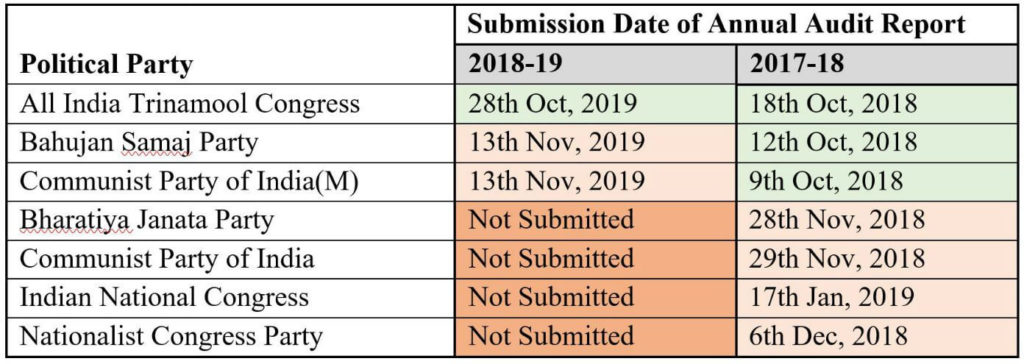
However, all the 7 National Parties have submitted Contribution Reports. Furthermore, only BSP, INC and NCP have submitted the contribution report prior to the cut-off date of 30th September.
As for Expenditure Report which needs to be filed within 90 days after Lok Sabha elections, the two largest National parties of BJP and INC have not yet submitted the same. Lok Sabha elections concluded on May 19, 2019.
The Status of submission of Expenditure Report and Contribution Report by each of the recognized National parties is given below

The income for 2018-19 has increased for both Trinamool Congress and BSP in 2018-19
Income of Trinamool Congress has significantly increased for financial year 2018-19, compared to 2017-18. For 2017-18, the income as per the annual audit report was around ₹ 5.2 crores which increased to ₹ 192.7 crores in 2018-19 i.e. an increase of 37 times. Even though the expenditure has not increased to this extent, there has been a significant increase in it as well. Trinamool Congress reported expenditure of ₹1.8 crores in 2017-18 which increased to ₹ 11.5 crores in 2018-19.
BSP also reported an increase in both its income & expenditure. In 2017-18, BSP showed an annual income of ₹ 51.7 crores which increased to ₹ 69.8 crores in 2018-19. However, the proportionate increase in their expenditure has affected the year end surplus. For 2017-18, the expenditure was shown as ₹14.8 crores which increased significantly in 2018-19 to ₹ 48.9 crores. Meanwhile, CPI(M) reported a slight fall in both the income received and the expenditure for 2018-19. The major reason for the increase in income in 2018-19 could be the Lok Sabha general elections, before which political parties could have raised funds.
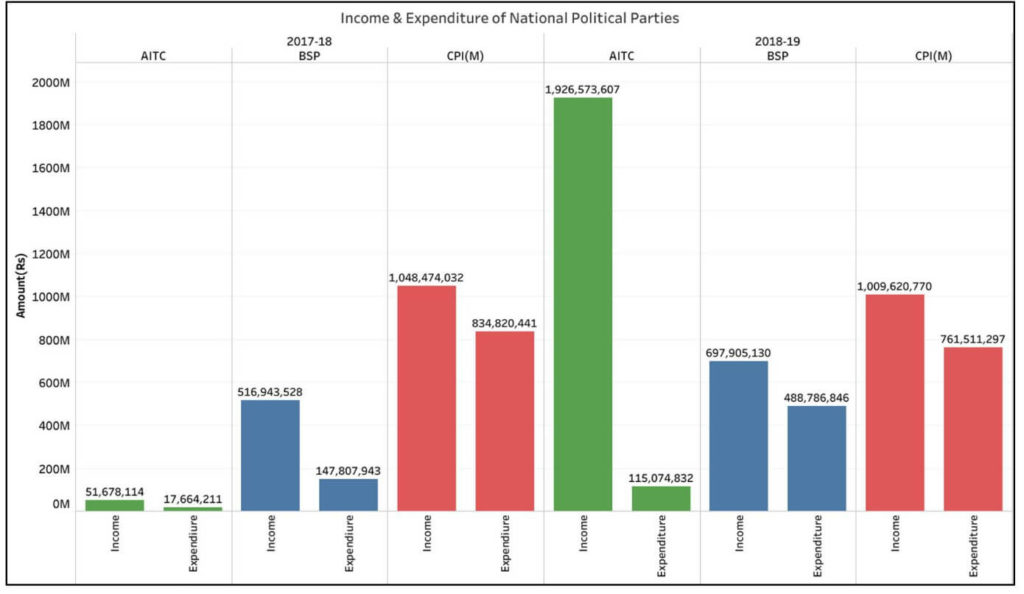
Trinamool’s increased income is due to increased Donations
For the year 2018-19, Trinamool Congress received contributions/donations worth ₹141.5 crores, which is a steep increase compared to 2017-18, when it received donations and contributions worth ₹ 0.3 crore.
Out of these total donations, ₹ 44.3 crores were received from donations/contributions worth more than ₹ 20,000 and hence the details of the donors are available. Furthermore, 97% of these donations above ₹20,000 are received from a single source – ‘Progressive Electoral Trust’, which contributed ₹ 42.9 crores.
On the other hand, nearly 69% of the contributions received are less than ₹ 20,000 each & through electoral bonds, hence the donor details of these donations are not known. In its annual audit report, Trinamool Congress reported to have received more than ₹ 97 crores worth electoral bonds in 2018-19.
Apart from contributions, the party also saw an increase in the amount received via ‘fees & subscriptions’, where in it received ₹ 49.4 crores n 2018-19 compared to ₹ 3.9 crores in the previous year.
Trinamool Congress collected ₹ 1.02 crores via issuance of coupons in 2018-19 while this source generated only around ₹ 9 lakhs in 2017-18. The remaining was from the other sources of income.
A major portion of the expenditure incurred in 2018-19 is under election expenditure for the Trinamool Congress. The party spent ₹ 9.6 crores in 2018-19 compared to ₹ 18 lakh the previous year. This increase in election expenditure can be attributed to the Lok Sabha general elections held in 2019, like in the case of increased income.
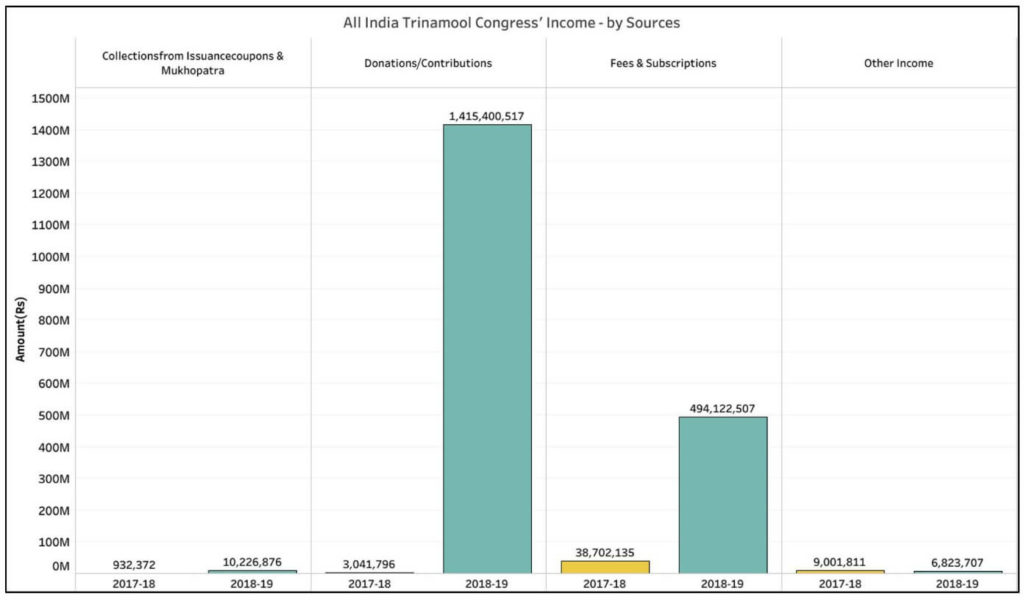
‘Fee & Subscriptions’ are the major source of income for the BSP
The income of BSP for the year 2018-19 is categorized under two broad sources – ‘Fee & Subscriptions’ and ‘Other Income’.
Conspicuously, no income is reported from ‘Grants/Donations/Contributions’ which happen to be one of the key sources of income in 2017-18.
The total revenue generated from fees & subscriptions in 2017-18 was ₹ 8.7 crores which increased to ₹ 30.9 crores in 2018-19
The annual audit report shows an income of ₹ 38.8 crores under ‘other income’ for 2018-19, which was ₹ 32.2 crores the previous year. This income is from bank interest and interest on income tax refund.
However, the income generated through ‘Grant/Donations/Contributions’ is NIL for 2018-19 where it was ₹ 10.7 crores in 2017-18. Hence, the Contribution Report , which is a mandatory report detailing the contribution made to the party ( for amounts above ₹20,000) does not reflect any details for 2018-19.
As is the case with Trinamool Congress, a major reason for the increase in expenditure for 2018-19 is election expenditure with ₹ 33.1 crores spent compared to ₹ 1.5 crores spent in the previous year.
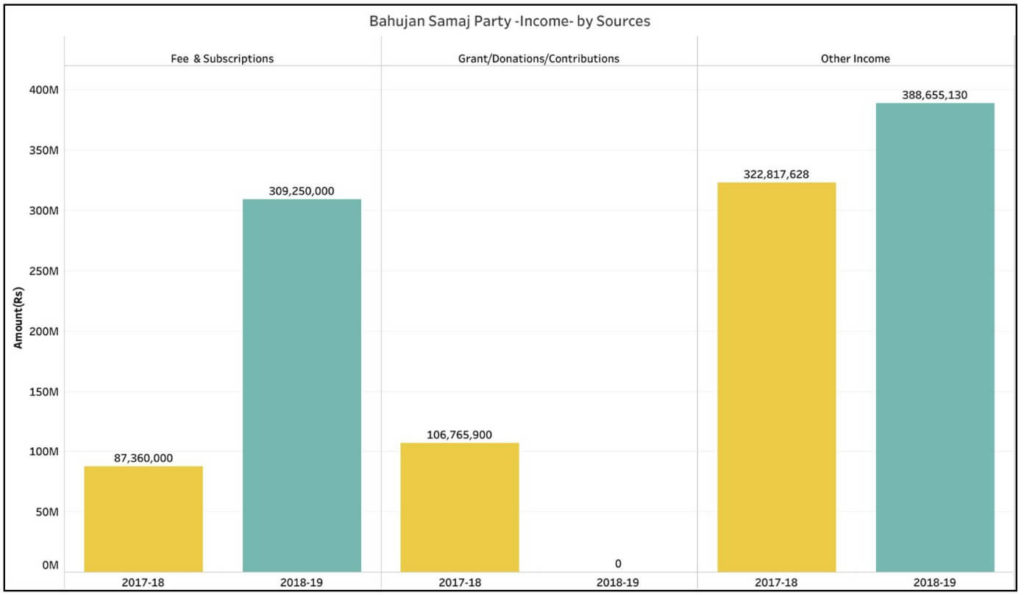
Income of CPI(M) hasn’t increased in 2018-19
Unlike the incomes of the other two recognized National parties, the income of CPI (M) has decreased in 2018-19 compared to 2017-18.
There is no increase in the contributions or other sources of income because of the election year, like in the case of Trinamool Congress and BSP. Furthermore, the proportion of revenue received from various sources is evenly distributed. Even the expenditure incurred does not reflect the impact of a general election year, with the expenditure incurred on elections in 2018-19 being ₹ 9.3 crores, slightly more than ₹ 9.1 crores incurred the previous year. The major share of expenditure in both the years is towards employee cost, admin & general expenses.
The contributions report submitted by CPI(M) does not show any abnormal contribution like in the case of Trinamool Congress.
However, it has to be noted that the income of CPI(M) albeit not very different but is higher than the other two national parties ( with exception of Trinamool Congress during 2018-19).
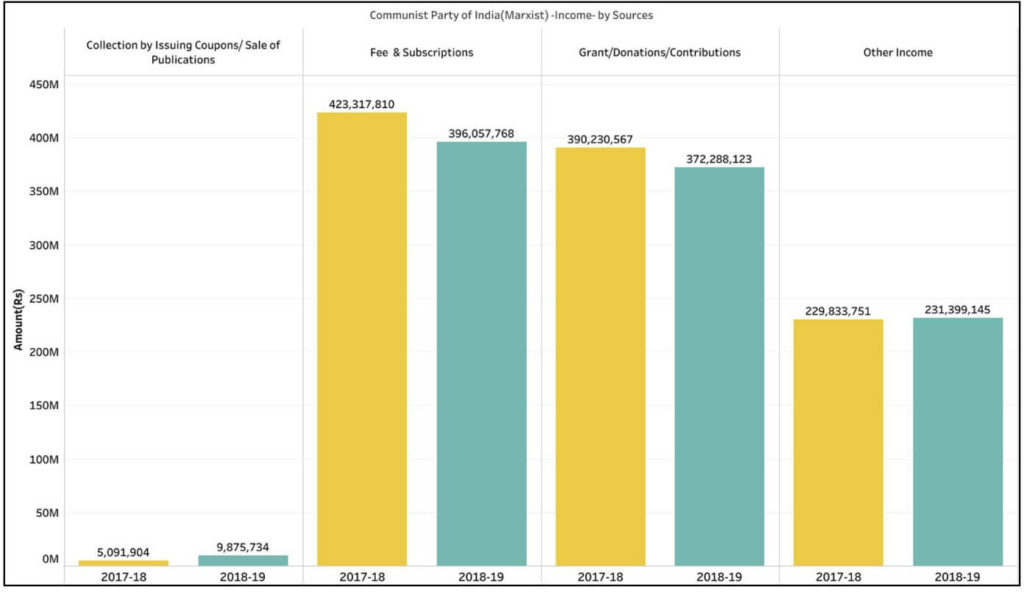
Submission of the prescribed financial reports only an initial step towards transparency in political funding
The ECI needs to first ensure that the recognized political parties (national & state) comply with the cut-off dates for submission of the various reports. Till date, only 3 out of the 7 recognized national parties have submitted the annual audit report within the cut-off date in 2018-19. Not just in 2018-19, the remaining 4 parties also delayed submission of reports in 2017-18.
Even among the recognized state parties, only 20 among 53 plus parties have so far submitted their annual audit reports.
Political parties are eligible for tax exemptions upon the submission of the audit reports. Making them in-eligible for tax exemptions and levying fines for delay in submission of these reports can help improve the situation.
Even in cases where these reports are submitted on time, there is very little transparency on who the donors are. For example, in the case of Trinamool Congress, close to 70% is from unknown sources and in the case of BSP, there is not a single contribution above ₹ 20,000 and hence the donor details are not known.
The Law Commission of India in its ‘Report on Electoral Reforms-2015’ has made recommendations in respect to various aspects like Electoral trusts, disclosure of contributions of less than ₹ 20,000 etc. among others. Factly has earlier written an article on some of the proposed reforms.
In further stories, we would look into the annual audit reports submitted by the recognized state parties and also explore the nature of contributions received by pollical parties including through electoral bonds.



2 Comments
Pingback: Only Half the State parties submit audit & contribution reports so far - Fact Checking Tools | Factbase.us
Pingback: One has to wait till October 2020 or more to know which parties benefitted from Electoral Bonds - Fact Checking Tools | Factbase.us